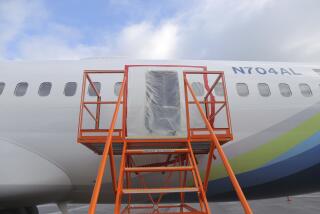Mary Barra: GM has ‘civic responsibility’ to compensate crash victims
- Share via
General Motors CEO Mary Barra said Tuesday she wants to find out if GM engineering employees executed a coverup or were merely incompetent in failing to recall a defective part linked to 13 deaths.
In testimony before a House Energy and Commerce Committee panel investigating why the automaker waited years to fix the vehicles, Barra said she has asked former U.S. attorney Anton “Tony” Valukas to help figure that out.
Previously Valukas investigated the collapse of the Lehman Bros. financial services firm in 2008.
Barra also issued yet another apology for GM’s failure to fix the problem years earlier. She conceded that company officials knew of issues with the faulty ignition switches behind the crashes and deaths for more than a decade.
Barra said she found the automaker’s worries about the cost to fix defective cars “disturbing.” Those concerns were detailed in documents obtained by the House committee.
“That is not acceptable,” Barra said. “Today, if there is safety issue ... if we know that there is a safety defect on our vehicles, we don’t look at the cost but at the speed at which we can fix the problem.”
Barra’s apologies notwithstanding, GM legally shed responsibility for crashes before the automaker’s 2009 bankruptcy and federal bailout. The restructuring created a new company, which bought the assets of the old GM, but allowed it to shed its debts and legal liabilities.
But Barra, in more than two hours of testimony, hinted GM might compensate victims and their families in connection with recall-related accidents that took place before the bankruptcy.
“We do understand we have civic responsibilities as well as legal responsibilities,” she said when asked about how the company would handle pre-bankruptcy crashes.
Rep. Tim Murphy (R-Pa.) asked if GM purposely withheld information about problems with the ignition switch and other safety issues when it was negotiating the terms of its bankruptcy and federal bailout in 2009.
Barra said she was not aware of any effort to hide information about potential liabilities, “but I can’t speak to every single person.”
Barra said the company has hired Kenneth Feinberg as a consultant to explore and evaluate options for the families of victims of accidents caused by the defective part.
“Mr. Feinberg is highly qualified, and is very experienced in the handling of matters such as this,” Barra said. “He brings expertise and objectivity to this effort, and will help us evaluate the situation and recommend the best path forward.”
Feinberg has previously handled compensation issues for victims of 9/11, the BP oil spill in the Gulf of Mexico and the Boston Marathon bombings.
“My mandate from the company is to consider the options for dealing with issues surrounding the ignition switch matter, and to do so in an independent, balanced and objective manner, based upon my prior experience,” Feinberg said.
Barra also told the panel that the automaker made “mistakes” in not recalling vehicles with a deadly flaw years ago.
Rep. Joe Barton (R-Texas) an industrial engineer, asked Barra why the company used an ignition switch that did not meet company specifications.
“Why in the world would a company with the stellar reputation of General Motors purchase a part that did not meet its own specifications?” he said.
Barra responded: “I want to know that as much as you do.”
When pressed on whether GM now would purchase parts that don’t meet specifications in the future, Barra said in some cases they do if the part meets safety, functionality and durability standards among others.
Barton called that answer “gobbledygook.”
“That’s not an acceptable answer for the American people,” he said. “There shouldn’t be a part used in any GM product ... that doesn’t meet the specifications.”
Although it knew about the problem as far back as 2001, GM only in the last two months has recalled 2.6 million vehicles to replace the defective ignition switch, which is now linked to 13 deaths. The switch can unintentionally turn off the vehicle and disable its airbags.
GM faces investigations from the NHTSA and the Justice Department into why it did not recall the vehicles sooner.
Barra is to be joined before the committee by David J. Friedman, the acting administrator of the National Highway Traffic Safety Administration. Lawmakers are set to quiz Friedman about why the safety agency didn’t force GM to recall the vehicles earlier. Documents show that the NHTSA was aware of the problem.
In his written testimony, Friedman said GM had failed to provide regulators “critical information” that could have triggered recalls years earlier. Only recently did GM provide “new evidence” that made it clear that the ignition problem could disable air bags, he said.
Meanwhile, families of victims of fatal crashes of the GM compact cars in question on Tuesday sharply criticized the automaker for delays in recalling the vehicles and called for legislation to prevent a repeat of the situation. About two dozen family members gathered in front of the Capitol to make their case before Barra and Friedman testified.
The families were joined by four Democratic lawmakers who want to toughen laws governing the disclosure of auto defects.
[For The Record, 5:46 p.m. PDT April 1: An earlier version of this post stated that Rep. Morgan Griffith (R-Va.) asked if GM purposely withheld information about problems with an ignition switch and other safety issues when it was negotiating the terms of its bankruptcy and federal bailout in 2009. The question was asked by Rep. Tim Murphy (R-Pa.)
Tweets from https://twitter.com/latimesbiz/autos
ALSO:
U.S. orders rear cameras for cars
Toyota admits to deceiving consumers, regulators
Federal bailout, bankruptcy lets GM escape liability in fatal crashes
Follow me on Twitter (@LATimesJerry), Facebook and Google+.








